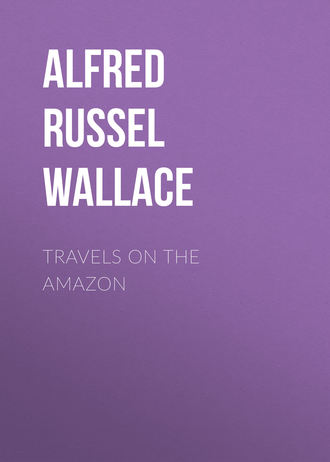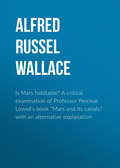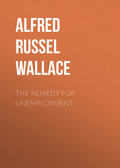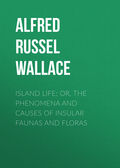
Alfred Russel Wallace
Travels on the Amazon
The house was situated close to the great marsh which extends from the Amazon to the serras. It was built of mud, with two or three rooms, and an open shed adjoining, used as kitchen and sleeping-place for the Indians. A corral—a square enclosed yard for the cattle—was near, and at the back rose the sloping ground towards the mountain. All around were interspersed thickets and open ground, and the picturesque masses of cactus rose in every direction. We strolled about a little before dark, and shot a couple of pretty green purple-shouldered paroquets, one of the smallest species that inhabits the country. When we returned to the house we were offered some new milk, and then sat outside the door looking at the strange accoutrements of some of the herdsmen, who were going on horseback to some distant part of the estate. Their curious and clumsy-looking wooden saddles, huge stirrups, long lassos, and leather ammunition-bags, with long guns and powder-horns of formidable dimensions, made them striking figures, and the more picturesque from their being dusky mulattoes. As soon as the sun set the mosquitoes made their appearance, and the doors of the house were shut, a pan of cow-dung lighted outside, and a lamp within. After a short time supper was announced, and we sat down on a mat on the floor to an excellent repast of turtle, which had been recently brought from the Amazon. We then turned into our hammocks, which were hung across the room in every direction. In fact, the house was pretty well occupied before we came, so that we were now rather crowded; but a Brazilian thinks nothing of that, and is used to sleep in company. The doors and windows were well closed, and though rather warm we did not suffer from the mosquitoes, an annoyance to which any other is preferable.
The next morning we prepared for our expedition to the mountain, and as we did not know whether we should have to stay the night, we provided ourselves with sufficient provisions, and a large gourd to carry water. We walked some miles along the side of the marsh, on which were many curious aquatic birds, till we arrived at a deserted cottage, where we made our breakfast, and then turned off by a path through a wood. On passing this we found ourselves at the foot of a steep slope, covered with huge blocks of stone, in the greatest confusion, overgrown with coarse sedges and shrubs, rendering any ascent among them extremely difficult. Just above was the curious pillar we had seen from the village, and which we determined to reach. After a most fatiguing scramble over the rocks and among innumerable chasms, we found ourselves on the platform below the columnar mass, which rises perpendicularly thirty or forty feet, and then hangs over at the top all round in a most curious and fearful manner. Its origin is very plainly to be seen. The pillar is of friable stone, in horizontal layers, and is constantly decaying away by the action of the weather. The top is formed by a stratum of hard crystalline rock, which resists the rain and sun, and is apparently now of the same diameter that the pillar which supports it originally was.
We had thought, looking from below, that we could have proceeded along the ridge of the mountain to the further end, where the cave and picture-writings were to be found. Now, however, we saw the whole summit completely covered with the same gigantic masses of rock and the same coarse rigid vegetation which had rendered our ascent so difficult, and made our proceeding for miles along similar ground quite out of the question. Our only remedy was to descend on the other side into the sandy plain which extended along its base. We first took a good view of the prospect which spread out before us,—a wide undulating plain covered with scattered trees and shrubs, with a yellow sandy soil and a brownish vegetation. Beyond this were seen, stretching out to the horizon, a succession of low conical and oblong hills, studding the distant plain in every direction. Not a house was to be seen, and the picture was one little calculated to impress the mind with a favourable idea of the fertility of the country or the beauty of tropical scenery. Our descent was very precipitous. Winding round chasms, creeping under overhanging rocks, clinging by roots and branches, we at length reached the bottom, and had level ground to walk on.
We now saw the whole side of the mountain, along its summit, split vertically into numerous rude columns, in all of which the action of the atmosphere on the different strata of which they were composed was more or less discernible. They diminished and increased in thickness as the soft and hard beds alternated, and in some places appeared like globes standing on pedestals, or the heads and bodies of huge giants. They did not seem to be prismatic, but to be the result of successive earthquake shocks, producing vertical cracks in cross directions, the action of the sun and rains then widening the fissures and forming completely detached columns.
As we proceeded along the sands we found the heat very oppressive. We had finished the water in our gourd, and knew not where to get more. Our Indian told us there was a spring halfway up the mountain, a little further on, but it might now have failed, as it was the height of the dry season.
We soon came in sight of the spot, and a group of Mauritia palms, which always grow in damp places, as well as some patches of brilliant green herbage, gave us hope. On reaching the palms we found a moist, boggy soil, but such a slow filtering of water among the weeds that it took nearly half an hour to fill our gourd. Seeing a mass of green at the very base of the perpendicular rocks higher up, where the spring appeared to issue, we proceeded there, and found, to our great joy, a little trickle of pure and delightfully cool water, and a shady place where we could rest and eat our lunch in comfort.
We then went on till we arrived where our guide said the cave was situated; but having been there only once he could not find it again, among the confused mass of rock which in several places appeared to present openings, but which on searching the spot deceived us. After various clamberings we gave up the search, and determined to return home and get a better guide another day.
On our way back we passed by a high cliff, on which were some of the picture-writings I had so much wished to see. They were executed in a red tint, produced apparently by rubbing them in with pieces of the rock, which in places is of that colour. They looked quite fresh, and were not at all obliterated by the weather, though no one knows their antiquity. They consisted of various figures, rudely executed, some representing animals, as the alligator and birds, others like some household utensils, and others again circles and mathematical figures, while there were some very complicated and fantastic forms: all were scattered irregularly over the rock to the height of eight or ten feet. The size of most of the figures was from one to two feet.
I took a general sketch of the whole, and some accurate tracings of the more curious single figures, which have unfortunately been since lost. The night felt chilly and damp, and we had nothing to cover ourselves with, or should have slept on the mountain. As it was, we arrived home very tired about eight o'clock, and were soon glad to turn into our hammocks.
The next day Senhor Nunez determined to go with us himself to show us the cave and some more picture-writings, situated in another part of the mountain. We now went on horseback, but could no more find the cave than before, and were forced to send our Indian for an old man who lived a couple of miles off, and who knew the place well. While he was gone, Senhor Nunez went with me to find the picture-writings, which we did after a fatiguing walk. They were situated on a perpendicular rock, rising from the top of a steep, stony slope, which almost deterred me from getting up to them, as I was very tired and thirsty, and there was no water. However, having come on purpose to see them, I was determined to persevere, and soon reached the place. They were much larger than the others, and extended higher up the rock; the figures, too, were all different, consisting principally of large concentric circles, called by the natives the sun and moon, and several others more complicated and three or four feet high. Among them were two dates of years about 1770, in very neat well-formed figures, which I have no doubt were the work of some travellers who wished to show that they knew how the others were executed, and to record the date of their visit. Near some of the higher figures were two or three impressions of hands in the same colour, showing the palm and all the fingers very distinctly, as if the person executing the upper figures had stood on another's shoulders and supported himself with one hand (smeared with the red colour) while he drew with the other. I also took copies of the figures at this place, which, being large and exposed, are visible from a considerable distance round, and are more generally known than the others, which are in a secluded and out-of-the-way situation, and were probably not visited by any European traveller before myself.
We walked some distance further, to get some water, before returning towards the cave. There we found that our guides had arrived, and they soon led us up a steep path to its mouth, which is so well concealed by trees and bushes that our failing to discover it was not to be wondered at. The entrance is a rude archway, fifteen or twenty feet high; but what is most curious is a thin piece of rock which runs completely across the opening, about five feet from the ground, like an irregular flat board. This stone has not fallen into its present position, but is a portion of the solid rock harder than the rest, so that it has resisted the force which cleared away the material above and below it. Inside there is a large irregularly arched chamber, with a smooth sandy floor, and at the end there are openings into other chambers; but as we had not brought candles we could not explore them. There was nothing about the cave at all remarkable, except the flat transverse rock at its mouth. The vegetation around it was by no means luxuriant or beautiful, nor were there any flowers worth noticing. In fact, many of our caves in the limestone districts of England are in every way more picturesque and interesting.
I had heard of a plant growing in the pools in the marsh, which I was convinced must be the Victoria regia. Senhor Nunez told me there were plenty near his house, and early the next morning he sent an Indian to try and get me one. After some search the man found one, with a half-opened flower, and brought it to me. The leaf was about four feet in diameter, and I was much pleased at length to see this celebrated plant; but as it has now become comparatively common in England, it is not necessary for me to describe it. It is found all over the Amazon district, but rarely or never in the river itself. It seems to delight in still waters, growing in inlets, lakes, or very quiet branches of the river, fully exposed to the sun. Here it grew in the pools left in the bog; but in June the water would be twenty or thirty feet deeper, so its leaf and flower-stalks must increase in length rapidly while the water rises, as they did not seem to be very long now. I took the leaf home, in order to dry some portions of it. It is called by the Indians "Uaupé Japóna" (the Jacana's oven), from the resemblance of the leaf, with its deep rim, to the clay ovens used for making farinha.
As we wished to get home that day, we took leave of our kind host, and again had to pole our way over the grass and weeds in the small stream. It did not, however, now seem so tedious as on our ascent, and we soon got into the open river.
Passing along a sandy shore, our Indian saw signs of turtles' eggs, and immediately jumped out and commenced scraping away the sand, in a very short time turning up a hatful of eggs of the small turtle called "Tracaxá." A little lower down there was an old tree giving a tempting shade, so we made a fire under it, boiled our eggs, made some coffee, and with some farinha and beef we had brought with us made an excellent breakfast. Proceeding on, we fell in with a great number of alligators, of a large size, swimming about in all directions. We fired at some of them, but only succeeded in making them dive rapidly to the bottom. They are much feared by the natives, who never venture far into the water when bathing. In a place where we had bathed a few days previously, we saw one close in shore, and resolved to be more careful for the future, as every year some lives are lost by incautiousness.
After a few days more at the village, we paid a visit to a mandiocca plantation some miles in the interior, where there is a considerable extent of forest-land, and where we therefore expected to find more insects. We went on foot, carrying our rédés, guns, boxes, nets, and other necessaries for a week's stay. On arriving, we found the only accommodation to consist of a little low thatched hut, just large enough to hang our hammocks in, and the only inhabitants four or five Negroes belonging to the place.
However, we soon made ourselves at home, and our little coffee-pot supplied us with an unfailing and refreshing luxury. We found in the forest several scarce butterflies pretty abundant, and among them a new species of Catagramma, which we had only met with very rarely at Pará; trogons and jacamars were also plentiful, but there was not any great variety either of birds or insects. There was no running stream here, but a kind of moist, marshy flat, in which shallow holes were dug and soon became filled with water, whence the only supply of this necessary was obtained.
On returning to the village my brother sprained his leg, which swelled and formed an abscess above the knee, quite preventing him from going out for a fortnight. After some trouble I purchased a small canoe here, in which I intended to return to Santarem, and afterwards proceed up the Amazon to Barra, on the Rio Negro.
A festa took place before we left. The church was decorated with leaves and flowers, and sweetmeats were provided for all visitors. Dancing and drinking then went on all night and during the following day, and we were left to cook our own meals, as our Indian was a performer on the violin, and did not think it at all necessary to ask us in order to absent himself two days. The Indians now came in from all the country round, and I bought a number of the pretty painted calabashes for which this place is celebrated.
Soon after we returned to Santarem, where we found our house occupied, but got another, consisting of two small mud-floored rooms and a yard at the back, situated at the further end of the town. We here engaged an old Negro woman to cook for us, and soon got into a regular routine of living. We rose at six, got ready our collecting-boxes, nets, etc., while our old cook was preparing breakfast, which we took at seven; and having given her money to buy meat and vegetables for dinner, started at eight for a walk of about three miles, to a good collecting-ground we had found below the town.
We continued hard at work till about two or three in the afternoon, generally procuring some new and interesting insects. Here was the haunt of the beautiful Callithea sapphira, one of the most lovely of butterflies, and of numerous curious and brilliant little Erycinidæ. As we returned we stayed to bathe in the Tapajoz, and on arriving at home immediately ate a watermelon, which was always ready for us, and which at that time we found most grateful and refreshing. We then changed our clothes, dined, set out our insects, and in the cool of the evening took tea, and called on or received visits from our Brazilian or English friends—among whom was now Mr. Spruce, the botanist, who arrived here from Pará shortly after we had returned from Montealegre.
The constant hard exercise, pure air, and good living, notwithstanding the intense heat, kept us in the most perfect health, and I have never altogether enjoyed myself so much. In Santarem there is an abundance of beef, fish, milk, and fruits, a dry soil, and clear water,—a conjunction of advantages seldom to be met with in this country. There were some boggy meadows here, more like those of Europe than one often sees so near the equator, on which were growing pretty small Melastomas and other flowers. The paths and campos were covered with flowering myrtles, tall Melastomas, and numbers of passion-flowers, convolvuluses, and bignonias. At the back of the town, a mile or two off, were some bare conical hills, to which I paid some visits. They were entirely formed of scoriæ, and were as barren and uninviting as can possibly be imagined. A curious tidal phenomenon was to be seen here: the tide rises in the Amazon to considerably above Santarem, but it never flows up, the water merely rising and falling. The river Tapajoz had now very little water, and its surface was below the level of the Amazon at high water, so that the tide was every day seen to flow up the Tapajoz, while a hundred yards out in the stream of the Amazon it was still flowing rapidly down.
It was now November, and as some rain had fallen, and gloomy weather had set in, we determined to start for the Rio Negro as soon as we could. Our canoe was at length ready, having taken us a long time to repair the bottom, which was quite rotten. After much delay the Commandante had procured us three Indians, who were to go with us only to Obydos, about three days up the Amazon, and had given us a letter to the authorities there, to furnish us with more. Mr. Spruce had set out for Obydos just a week before us, in a large canoe, the owner of which had offered him a passage. On our arrival we found him unpacking his things, and he told us he had only got there the night previous, having been ten days on a journey which is frequently performed in a day and a night: want of wind was the cause, and the owner of the canoe, who was with them, would not move at night. But to such delays the unfortunate traveller who ventures on the Amazon must make up his mind patiently to submit. Captain Hislop had written to a friend of his to lend us an unoccupied house, where we had to remain several days quite alone, for our Indians, after unloading the canoe, went off immediately, and we could not get others till the Commandante had sent to fetch them from a considerable distance.
We amused ourselves in the forest, where we found insects very abundant, but mostly of species we had before obtained. As our canoe had leaked so much in coming here that we were almost afraid to venture in it, we had it pulled up on the beach, and discovered some of the cracks, which we stopped as well as we could by plugging in cotton dipped in hot pitch. At length we set off again with two Indians, who were to go with us only to Villa Nova, the next town, about four days' voyage from Obydos. As we had only two, we could not do much with the paddles, one being required at the helm; but luckily the wind was strong and steady, and we went on day and night very briskly. We had to cross the river several times, generally at night. The wind created a great swell, and as we dashed along furiously through it, I was rather doubtful of our rotten boat holding together. In four days, however, we reached Villa Nova in safety, and I was very glad to have got so far on our way. We were kindly received on the beach by the priest of the village, Padre Torquato, who invited us in such a pressing manner to stay in his house till we should get men to go on, that we could not refuse. The Commandante, to whom we brought letters, to give us more men, was out at his sitio; they therefore had to be sent after him, and it would probably be several days before we had an answer, and perhaps much longer before the men were procured.
The Padre was a very well-educated and gentlemanly man, and made us as comfortable as he could, though, as he had only two small rooms to share with us, he was putting himself to much inconvenience on our account. He is already known to the English reader from having accompanied Prince Adalbert of Prussia up the Xingu, and he well deserves all the encomiums the Prince has bestowed upon him. He was very fond of enigmas, which he amused himself and his friends by inventing and solving. I much delighted him by turning such of our best as would bear the process into Portuguese; and I also translated for him the old puzzle on the word "tobacco"—in Portuguese, "tabaco," which did just as well—and much pleased him. I took here some fine insects, but it was too late in the season: from July to October Villa Nova would, I have no doubt, be a fine locality for an entomologist.
A week passed away, and the men came not, and as I was very anxious to be off, the Padre agreed with a trader to let me have three of his Indians, he taking instead those that the Commandante would probably soon send for me. One of the Indians, however, did not choose to come, and was driven to the canoe by severe lashes, and at the point of the bayonet. He was very furious and sullen when he came on board, vowing that he would not go with me, and would take vengeance on those who had forced him on board. He complained bitterly of being treated like a slave, and I could not much blame him. I tried what I could to pacify him, offering him good pay and plenty to eat and drink, but to no purpose; he declared he would go back from the first place we stopped at, and kill the man who had struck him. At the same time he was very civil, assuring me that he felt no ill-will against me, as I had had nothing to do with it. It was afternoon when we started, and about sunset we stayed to make supper; and then the ill-used Indian politely wished me good-bye, and taking his bundle of clothes returned through the forest to the village. As I could not go on with two only, I sent one of them back early in the morning to get another in the place of the one who had run away, which he did, and returning about ten o'clock, we pursued our journey.
We went along slowly, now and then sailing, but generally rowing, and suffering much annoyance from the rain, which was almost incessant. The mosquitoes, too, were a great torture: night after night we were kept in a state of feverish irritation, unable to close our eyes for a moment. Our Indians suffered quite as much as ourselves: it is a great mistake to suppose that the mosquitoes do not bite them. You hear them, all night long, slapping on their bare bodies to drive their tormentors off; or they will completely roll themselves up in the sail, suffering the pangs of semi-suffocation to escape from the irritating bites. There are particular spots along the banks of the river where there are no mosquitoes; and no inducement would make our men paddle so hard as the probability of reaching one of these places before midnight, and being enabled to enjoy the comforts of sleep till morning.
Towards the end of December, we reached the little village of Serpa, where we found a festa or procession going on,—a number of women and girls, with ribands and flowers, dancing along to the church with the priest at their head, in a most ludicrous manner. In the evening we went to the house where the dancing took place, and had some wine and sweetmeats. We bought here some coffee and a large basket of plantains. On Christmas day we reached a house where they had just caught a quantity of fish, and we wanted to buy some, which was refused, but they gave us a fine fat piece for our dinner. We bought some eggs, and when we stopped for the day concocted a farinha pudding, and so, with our fish and coffee, made a very tolerable Christmas dinner, while eating which our thoughts turned to our distant home, and to dear friends who at their more luxurious tables would think of us far away upon the Amazon.







